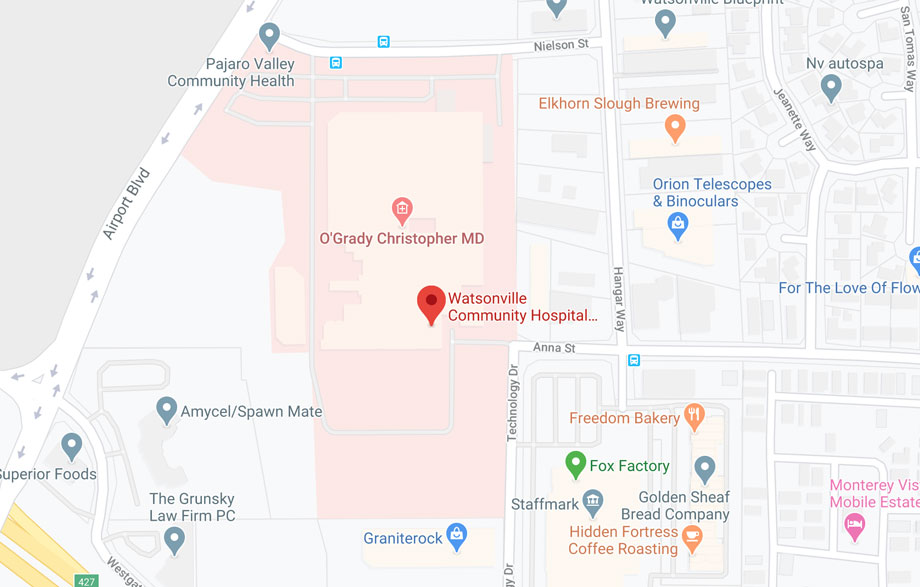EMERGENCY DEPARTMENT
In a medical emergency, every minute matters. That’s why our emergency room is dedicated to providing rapid, expert care when you need it most. Open 24/7, we offer comprehensive services for all types of emergencies, from minor injuries to life-threatening conditions. Staffed by highly trained physicians, nurses, and specialists, we ensure fast, compassionate, and advanced medical treatment.
Whether you’re dealing with sudden illness, injury, or severe pain, our team is here to provide immediate attention and personalized care, ensuring your health and safety are our top priority. When every second counts, trust us to deliver exceptional emergency care.
If you are experiencing a medical emergency, call 9-1-1 or go directly to the closest ER.
Why Choose Us?
- In an emergency, and for care after an emergency visit, you can count on the experienced team at Watsonville Community Hospital.
- When your child needs emergency care, turn to the ER at Watsonville Community Hospital. Pediatric hospitalists from Lucile Packard Children’s Hospital Stanford, who specialize in providing newborn and pediatric care in a hospital setting, are here 24/7. They’re available to the ER physicians when requested to consult. And should your child require inpatient services, the pediatric hospitalists will provide specialized, family-centered care.
- In addition, specialists on staff in Orthopedics, General Surgery, Gastroenterology, and Cardiology means we are here for you when you need us most.
Preparing for an ER Visit
A trip to the ER can often be stressful or scary- but it doesn’t have to be. A few minor preparations can help your visit go smoothly.
What to Expect
Bring support. If you can, have a trusted friend or family member accompany you to the ER. This person can not only help you explain your condition to the ER staff, but they can also help you to understand and remember important medical information.
Honestly describe your illness and don’t be afraid to use details. Any and all information regarding your condition may help ER staff make an accurate diagnosis and begin treatment quicker.
Be prepared to wait. In the ER, patients are seen by doctors according to the severity of their symptoms, not in the order of arrival. Being prepared to wait for your turn may decrease feelings of stress and anxiety.
Don’t be afraid to ask. During your visit to the ER, don’t be afraid to ask the physicians, nurses or staff if you do not understand. Tests, procedures, your diagnosis and even follow-up care instructions can be confusing.
What to Bring
If you are able to collect these without delay in seeking care, please bring the following items with you to the ER:
- contact information for your personal doctors
- detailed medical history and current condition information, including dates of major surgeries
- health insurance card and photo ID
- list of any allergies you have
- names, dosages, and how often you are currently taking any prescription or over-the-counter medications, vitamins or dietary supplements
- comfort items such as bottled water and a music player for yourself or a favorite blanket, book or toy for your child
Before Heading Home
Before leaving the ER, it’s important that you, or a trusted family member or friend, completely understands the information given to you by the ER staff. Understanding and following discharge instructions, including medications and/or home care procedures, are vital to helping your condition improve. If you do not understand any information given to you by the ER staff, ask for clarification.
Symptoms You Should Never Ignore
Minor illnesses can often wait, but some symptoms always demand immediate medical attention. These can include things like head injuries, high fevers and signs of heart attack or stroke.
Recognizing Serious Illness or Injury
Fainting, fevers greater than 100.4 degrees Fahrenheit in infants and 105 degrees in older children and adults, severe pain anywhere in the body, and significant vomiting and diarrhea require immediate evaluation. In terms of injuries, head injuries — especially those accompanied by loss of consciousness and/or vomiting — and deep wounds causing unmanageable bleeding are best managed in the ER.
Heart Attacks and Strokes
A heart attack is often recognized by symptoms such as chest pain, shortness of breath and upper-body discomfort, while stroke symptoms can include severe headache, disorientation, difficulty walking and/or speaking, and weakness or numbness on one side of the body.
But there are lesser-known signs of heart attacks and strokes that you might not be aware of. Women’s heart attack and stroke symptoms often differ from those experienced by men. Fatigue and nausea are common heart attack symptoms in women, while women’s stroke symptoms may include chest pain, heart palpitations, nausea and shortness of breath, according to the National Stroke Association.
The Bottom Line
Although the symptoms mentioned above are commonly associated with medical emergencies, you know your body best and should always feel comfortable seeking emergency medical care any time you experience unusual or concerning symptoms. This will not only set your mind at ease, but also ensure you have quick access to potentially lifesaving medical care, if needed.
Are You Having A Heart Attack?
In the movies, signs of a heart attack seem straightforward and dramatic. In real life, heart attack symptoms can happen anywhere on your body- not just in your chest. They can vary in intensity and are often different for men and women. It’s important to know what to watch for. If you experience these symptoms and think you are having a heart attack, seek immediate emergency medical help by dialing 911.
- Chest: pressure, aching, burning sensation, shortness of breath, fullness, squeezing or rapid heart rate
- Arms: heaviness, weakness, aching, numbness, pinching, pain, prickling or discomfort
- Back: pain, usually between the shoulder blades
- Shoulders, neck and jaw: aching, pain, prickling or discomfort
- Abdomen: nausea, pain or indigestion
- Head: dizziness, anxiety, memory loss, trouble concentrating, lightheadedness or confusion
- All over: unusual fatigue, sweating, weakness, flu-like symptoms, feeling overheated or sleep disturbances




